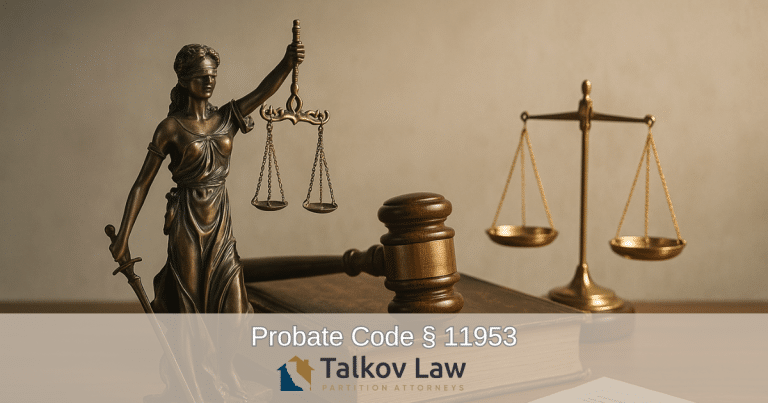California Probate Code § 11953 is the California probate statute that governs how property should be divided among multiple beneficiaries who hold undivided interests in estate property, i.e., co-ownership. This section ensures that each beneficiary receives a portion of property equal in value to their share of the estate and allows for a sale when division is impractical. The statute provides that:
(a) The court shall partition, allot, or otherwise divide the property so that each party receives property with a value proportionate to the value of the party’s interest in the whole.
(b) The court may direct the personal representative to sell property where, under the circumstances, sale would be more equitable than partition and where the property cannot conveniently be allotted to any one party. The sale shall be conducted in the same manner as other sales made during administration of an estate.
(c) Any two or more parties may agree to accept undivided interests.
California Probate Code § 11953
This statute gives the court flexibility to divide estate property in a fair and practical manner, whether by physical division, sale, or mutual agreement between beneficiaries. It presents a very limited exception to a traditional civil partition only where there was one owner who is now deceased. However, once a judgment or deed is recorded transferring the property to multiple owners, this statute cannot provide an court-ordered end to a co-ownership relationship, leaving partition as the only option.
Relationship Between Probate Code § 11953 and Partition Actions
Like Probate Code § 11950, Section 11953 parallels the principles of California’s partition laws under CCP §§ 872.010 et seq., but within the context of estate administration. The key difference is that § 11953 applies when the estate is still under the supervision of the probate court and property must be distributed fairly among beneficiaries.
The court’s ability to order a sale under § 11953 serves a similar function to a partition by sale under the Code of Civil Procedure, allowing liquidation when a physical division is not feasible. This ensures that beneficiaries receive the monetary value of their interests without compromising the estate’s efficiency or fairness.
Talkov Law Partition Attorneys Can Help
If you are a beneficiary or heir involved in a dispute over inherited property or need assistance dividing estate assets, Talkov Law Partition Attorneys can help navigate the issues with probate, including when the decedent in the probate owned a fractional interests or when the probate distributes fractional interests to the beneficiaries (heirs). Our team has successfully resolved hundreds of real property partition and inheritance disputes across California, ensuring fair outcomes for co-owners and beneficiaries alike.
Call (877) PARTITION (727-8484) or contact us online today to speak with California’s leading property division law firm.







































































































































